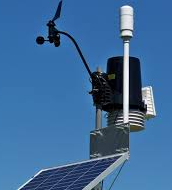Maharashtra becomes First State to Use Automated Weather Stations (AWS) for Farmers
Maharashtra chief minister Devendra Fadnavis has inaugurated the state’s first automatic weather station at Dongargaon in Nagpur. The state government proposes to install around 2,065 such weather stations across the state on a public private partnership (PPP) mode in this year and 1,000 in next year.
The weather stations will be helpful in measuring the wind direction, wind speed, air temperature, relative humidity and record amount of rainfall.
The information gathered by the weather stations would be shared among the farmers by making them available on Mahavedh portal (Maharashtra agriculture weather information network) as well as on the mobile application of Skymet. Weather forecast firm Skymet Weather Private Ltd will be setting up these weather stations.
Significance
The farmers of the state can make use of the information to manage sowing in a much better and planned way as per the weather conditions. These weather stations are significant because the IMD forecast is limited to only four zones. The weather related information is not made available by the IMD at the level of taluks. But, the AWS will provide forecast up to taluka level. As one weather station will be installed for an area of around 12×12 km, micro-level weather forecasts will be possible.
In addition, the digital kiosks will be set-up in every Gram Panchayat to disburse weather related information and expert advice on crop pattern to the farmers. During the first phase, information will be shared using SMS. In the second phase, half hourly updates will be provided to all the Gram Panchayats. The sensors of the AWS will be able to record important parameters relevant for agriculture like temperature, relative humidity, wind speed and direction, rainfall, solar radiation, leaf wetness, soil moisture and temperature and atmospheric pressure and evapotranspiration.
The state government plans to use the data provided by the AWS to prepare location-specific agriculture advisories, better disaster management, design crop insurance schemes and establish a weather database bank.
Month: Current Affairs - May, 2017


